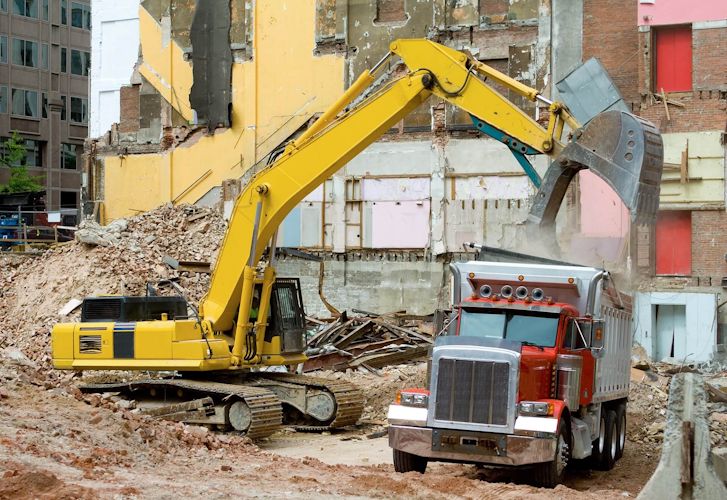Limit Pollution and Stay Healthy
Learning about your dumpster rentals and waste management
Home - 2024
Year: 2024
Organizing a Neighborhood Cleanout with a Dumpster Rental
Posted on December 15, 2024 in Dumpster Rentals
We love a neighborhood clean out in Georgia, these events not only bring a sense of community but they help make your neighborhood more beautiful and livable as well.
So whether you’re cleaning out your messy garage, clearing an empty lot or removing yard waste, a dumpster rental will keep the disposal process both efficient and organized. Here’s a step-by-step guide to planning and executing a successful neighborhood cleanup using a dumpster rental.
Plan and Prepare the Event
Planning is the first step to organizing a successful event. So the first step is to define the scope and goals of the cleanout. Is it geared towards cleaning of household rubbish, garden debris, or public spaces like parks or streets? When you have clarity, do these things:
- Create a Committee: Involve a few neighbors to help with logistics, communication, and organizing volunteers
- Fix a Date and Involve Them: Pick out a weekend day when maximum participation is achievable. Be sure to allow time for the cleanup, usually 4-6 hours
- Budget: account for battling the dumpster rental, gloves, rubbish luggage and other supplies. Other funding and reimbursement options also may be available through neighborhood associations or local government programs
Rent the Right Dumpster
The dumpster rental is the linchpin of your cleanout event, so making the right choice is vital:
- Choose the Right Size: Most of the time, a 20- or 30-yard dumpster is all that is needed for neighborhood cleanouts. A 20-yard dumpster is adequate for items tossed out in a small cleanout, while a 30-yard dumpster is appropriate for bigger jobs
- Consider Waste Type: Let the rental company know what types of waste you plan on disposing of. Certain products, such as hazardous materials, electronics, or tires, may require special disposal methods or could incur additional fees
- Get a Reputable Provider: Read reviews and do price comparisons with local dumpster rental companies. Some companies may give discounts for community cleanups
Obtain Necessary Permits
Local government like Marietta may require a permit if the dumpster will go on public property, like a street or sidewalk. Check with your city’s public works department for requirements, fees and processing times. Have permission from an owner if it is going on private property.
Promote the Event
Spread the word If you want a successful event, you need people to show up. Use a combination of messaging platforms to target everybody in the community:
- Flyers: Hand out printed flyers or glue these at community boards
- Social Media: Set up a Facebook event or use neighborhood apps such as Nextdoor to get the word out and share updates
- Word of Mouth: Ask committee members and volunteers to invite neighbors in person
- Email Lists: Send a detailed event announcement to your neighborhood association email list if your association has one
Coordinate Logistics
Seamless logistics make sure the event functions smoothly and avoids confusion:
- Dumpster Placement: Coordinate with the rental company to determine an accessible, central spot for the dumpster. Keep the site clear and safe for volunteers
- Tools and Supplies: Provide gloves, trash bags, rakes, shovels and wheelbarrows for participants. Request volunteers to bring functions if needed
- Sort waste: Think about designating locations for recyclables, donations, and trash. Charities do pick up old furniture that is in good condition
Drive Engagement And Motivation For Volunteers
Create a fun and rewarding experience that encourages community involvement:
- As Assignment of Roles: Divide up the work among all those who will be there to collect litter, recycle items, deliver to a dumpster, etc
- Keep Volunteers Hydrated: Provide water, coffee, and snacks to help volunteers stay energized
- Keep it Fun: Play music, add in friendly competition — prizes for the most trash collected, for instance
Dispose of the Waste Properly
The dumpster rental company handles waste disposal at the end of the event, but you can take steps to make sure that process is an eco-friendly one:
- Share Resources: Exchange or lend items with your neighbors to avoid unnecessary purchases and reduce waste
- Carefully discard hazardous waste: Things such as paint, batteries or chemicals, must go to the right places
Celebrate and Reflect
Once the cleanout is done, take a moment to celebrate the efforts of the community and assess how the event went:
- After removing, take a group photo by the dumpster as a sign of celebration for the effort
- Thank Volunteers: Thank attendees, either through a follow-up email, a social media post, or a small gift
- Collect feedback: Get their opinion on what went well and what would need improvement for upcoming events
The Advantages Of Clean-Outs In Neighborhoods
Doing a neighborhood cleanout is not just about waste disposal. It connects neighbors, raises property values, and provides a safer and cleaner place to live for all. A dumpster rental can help your community achieve these goals efficiently and sustainably with a well-executed plan.
A neighborhood cleanout may take some time to get organized, but the benefits—you and your community, not to mention the environment—far outweigh the drawbacks. So work together and make use of a dumpster rental, and your neighborhood will be an inspiring display of team work and civic pride.
Demolition Done Right: Essential Safety Tips for a Secure Worksite
Posted on March 1, 2024 in Dumpster Rentals

Carrying out demolition work safely: what to do
Demolishing a house in Texas is a complex task that requires careful planning and precise execution to ensure the safety of workers, neighboring residents and the environment. When it comes to safely carrying out a house demolition, it is essential to follow strict procedures, use appropriate equipment and respect current safety regulations. And let’s not forget to mention waste management issues, as all the construction debris must be removed!
Initial site assessment
Before undertaking the demolition of a house, it is imperative to carry out a complete assessment of the site. This includes inspecting existing structures, identifying potentially hazardous materials such as asbestos, and checking environmental conditions. A careful assessment allows you to design a precise demolition plan, taking into account all possible risk factors.
For a precise evaluation of your project, you can contact a company specializing in this field.
Obtaining the necessary local authorizations
Before starting demolition work, it is crucial to obtain all necessary permissions from local authorities. This often includes demolition permits, environmental permits, and other area-specific approvals.
Ensuring regulatory compliance from the outset is essential to avoid costly delays and legal complications later. Your demolition project can therefore continue with complete peace of mind.
Selection of appropriate equipment
The choice of demolition equipment is a critical step to ensure the safety of the process. Appropriate demolition equipment, such as backhoes, jackhammers and controlled explosives, should be selected based on the size and structure of the house.
Equipment operators must be trained and certified to ensure safe and efficient use. Naturally, these operators must also wear personal protective equipment. This avoids accidents during work.
Site preparation
Before commencing actual demolition, it is necessary to prepare the site appropriately. This includes the establishment of security barriers to restrict access to unauthorized persons, the disposal of hazardous waste as well as the protection of neighboring infrastructure. Proper site preparation helps minimize potential risks and ensure job site safety.
Waste Management Services
The management of waste from demolition is an essential component of the process. Materials such as wood, metal, concrete and other debris should be sorted and disposed of responsibly. Some materials can be recycled, helping to reduce the environmental impact of demolition. Hazardous waste must be disposed of in accordance with regulatory standards.
After the demolition is completed, effective waste management is crucial for environmental sustainability and public safety. The process involves sorting, recycling, and disposing of various materials generated from the demolition site. Concrete, bricks, and metals are often salvaged for recycling, reducing the burden on landfills and conserving resources. Hazardous materials like asbestos must be carefully handled and disposed of according to regulations to prevent health risks, possibly using dumpster rental services.
Proper waste management also involves controlling dust and debris to minimize air and water pollution. This may include using water sprays, barriers, and covering materials during demolition and cleanup. Additionally, waste management plans should prioritize the reuse of materials whenever possible, promoting a circular economy and reducing the need for new resource extraction.
Community engagement plays a vital role in waste management post-demolition, ensuring local residents are informed about disposal procedures and potential hazards. By implementing comprehensive a waste management planning, a demolition project can minimize its environmental footprint and contribute to a cleaner, safer future.
Dust and emissions control
Demolition can generate significant amounts of dust and potentially harmful emissions. It is imperative to adopt adequate control measures, such as using water sprayers to reduce dust and installing filters on equipment to limit emissions. These precautions help preserve the quality of the surrounding air.
Continuous monitoring
Throughout the demolition process, continuous monitoring is necessary to quickly detect and resolve any potential problems. This includes vibration monitoring, waste management, and checking the stability of remaining structures. Regular communication between members of the demolition team is also crucial to ensuring the overall safety of the construction site.
Carrying out a safe house demolition requires careful planning, precise execution and strict adherence to safety standards. Through a thorough initial assessment, obtaining necessary permits, selecting appropriate equipment, site preparation, waste management, dumpster rentals, emissions control and ongoing monitoring, it is possible to accomplish safe demolition while minimizing risks to people and the environment. By following these steps, demolition professionals can guarantee the success of the project while preserving the safety and health of everyone involved.
 I try my best to only publish information that is 100% verified and scientifically proven.
I try my best to only publish information that is 100% verified and scientifically proven.